- Home
- Lauren Oliver
Ringer Page 6
Ringer Read online
Page 6
Gemma was led to a bathroom with no stalls at all, just toilets bolted to the floor at regular intervals. A nurse was summoned—she was wearing a shapeless medical smock over her street clothes, and had that blind-mole look of someone who’d just been asleep—to unbutton Gemma’s reeking pants and underwear and haul them to her hips while Gemma peed, since her wrists were still bound.
The nurse’s hands were cold. Gemma tried to blink away the sudden pressure of tears: the woman’s fingers swept the place between Gemma’s legs when she went to hitch up Gemma’s underwear and then jeans.
“Sorry,” the nurse whispered. “We’ll find you something dry to put on in a bit.” But Gemma felt something come down around her, some inner space collapsing.
There was no air-conditioning. If it wasn’t obvious enough from the smell of must and raw wood, from the filthy corners and cables of dust visible through open gaps in the walls, it was clear to her now: whatever this place was, it wasn’t like Haven. There was no experimentation here, no medical treatments or analyses. This was a holding pen, pure and simple.
Outside the bathroom, the woman in the pantsuit was waiting, yawning behind a hand. She straightened up and frowned briefly at Gemma. “Well?”
“Well what?” the nurse responded, keeping a hand on Gemma’s elbow. Her touch was surprisingly gentle, as if she wanted to make up for what had happened in the bathroom.
“That’s the last of them, isn’t it?”
“How should I know?” The two women obviously despised each other. “That’s your business. What I’m supposed to do is keep them alive.” Gemma disliked the way she emphasized that. It suggested the other woman’s business was something else entirely.
“No need to get defensive. I was just asking. They all look the same to me, even the ones that aren’t doubled.”
“I bet.” The nurse’s voice was hard with sarcasm. “We still have bodies to match. Some of ’em no more than fingers—thanks to you.” She sniffed. “But if you say so, you say so.”
They moved again down the hall, cavernous with shadow, and half-splintered spaces suggesting their original purpose: countertops, old glass display cases where she imagined sandwiches withering behind glass.
Something smelled: a trash smell, an inside-of-the-body smell. The scent of urine was strong. They stopped to draw water from a long industrial sink: plastic cups overflowed a massive trash can. The nurse had to hold the cup while Gemma suckled at it like a baby, but she was too thirsty to say no. Then, to her surprise, the woman turned Gemma and released her handcuffs. Gemma nearly fainted from the rush of pleasure, of relief, when she could move her shoulders freely.
But she understood, as the woman gestured her on, why the restraints weren’t necessary: patterns of footsteps sounded softly on the linoleum, overlapping, like the drum of distant rain. Soldiers with guns. Even when they hung back in the dark she could see the barrels winking like animal eyes.
“Be a good one, now, and you won’t get in any trouble,” the nurse said. For the first time since being taken into the van, she felt a spark of hope. This woman wasn’t evil. Maybe she could be made to understand. To believe.
“Please listen to me.” Gemma spoke in a whisper. Her throat was raw from crying. “My name is Gemma Ives. I live in Chapel Hill, North Carolina. I have parents. They’re looking for me.”
She couldn’t tell whether the woman was even listening. This part of the airport was almost completely dark: a runner of cheap battery-pack lights lit a narrow aisle of floor, like those on an airplane designed to help you find your way to the emergency exit. Around them furniture was lumped and piled and stacked in the darkness. It looked like a whole warehouse had been emptied. The smell was terrible, too. It was so bad it had weight, and form, and even movement. They paused briefly in front of a set of plastic shelves piled with cheap T-shirts and plain cotton pants, laundered to the point of stiffness.
“Laundry day’s Friday,” the nurse said. “You’ll get a replacement soon as you turn in this pair.”
“Please,” Gemma said. She found herself speaking in a whisper, as once again fear flooded into her, poured down her throat like the taste on the air, like the grit of human skin and nails. “I don’t belong here.”
Someone moaned. Then a cry in the dark, quickly stifled. But the sound seemed to find Gemma, to burrow deep in her chest, like a hook. And at the same time her eyes adjusted, she realized that what she’d mistaken for piles of furniture were really people, girls: hundreds of girls, dressed identically, some of them visibly wounded, others so thin they looked like a wreckage of bones; sleeping on the floor, on mattresses, on piles of fabric and tarps, on stacked blankets.
“Nobody belongs here, child,” the nurse said. She was holding her throat. Gemma saw a small gold cross nested between her fingers. “Not even the devil himself.”
Turn the page to continue reading Gemma’s story. Click here to read Chapter 9 of Lyra’s story.
PART II
TEN
KRISTINA IVES SPENT THE FIRST day of her fifty-first year crying, and picking the cuticles of her fingernails until they bled, and then shivering damply in bed, waiting for the Xanax to take effect, and the second day counting all the ugly things she could find on the way to Nashville, Tennessee.
A dead deer, mangled on the side of the highway. A house punched in by age and neglect, spilling its rot onto the porch, as if it had been gutted. Billboards advertising strip clubs, XXX stores, erectile dysfunction clinics.
Since having Gemma, she’d hardly ever traveled: she liked to be home with her things, in the beautiful house with the rugs that went hush hush, with Rufus and the cats and the pool in summertime where she could lie out with a book, her feet damp with dew and new grass, the hum of a lawn mower in the background like the pleasant buzz of one of her pills.
They had a house in Vail and Geoff hosted clients there several times a year, but she hadn’t been, not since Gemma was a toddler. Though Geoff had urged her to learn to ski, she could never see the point in it, the suiting up and the rentals and the waiting in line to crank all the way to the summit only to plunge down the mountain again.
One time, only one time, he’d convinced her to put Gemma in ski school. She was maybe four years old, so young even she didn’t remember the experience, and Kristina had stood with a crowd of other parents in the lodge while outside a group of fluorescent children made pie-wedges with their skis. No one else was worried—the other mothers and the scattered father drank spiked hot cocoa or went off on runs of their own—but Kristina had stayed at the windowpane, her breath misting the glass, watching the little gob of purple that was her only daughter, funny-faced and precocious with cheeks so fat Kristina had to stop herself from biting them.
She’d read once that during World War II many of the Jews had sewn their precious belongings, jewels and watches and things, into the lining of their coats before fleeing, and she’d immediately understood: Gemma was like that, like a secret, precious thing sewed not into the lining of her coat but into who she was deep down, at her core, as a person.
She saw it even before it happened. Saw Gemma’s puffy-coated arms begin flapping frantically, saw her teeter on her tiny skis. And she saw, at the same time, beneath Gemma’s coat and beneath her skin, to the webbing of her narrow bones and all the fragile organs tucked among them, so easily punctured, ruptured, burst; and she was out the door and running, calling for Gemma to stop, be careful, stop, so that Gemma, looking up at her mother, lost her balance and fell.
So Kristina didn’t go to Vail anymore. They had a place in the Outer Banks, but there, too, she rarely went. Gemma loved it, but Kristina could never keep down images of Gemma drowned in the waves, pummeled by sand, her lungs bloated with seawater. And she had another fear—that she would have to bring Gemma to an unfamiliar hospital, that blood would be drawn, or bones x-rayed, and somehow, the doctors would know. That evidence of Kristina and Geoff’s crime might be encoded in every single one of Gemm
a’s cells, embedded in the filaments of her DNA.
She’d been in the kitchen, rinsing out stray wineglasses that Geoff must have collected from the deck, when the call came in. Sunday: her favorite day. She never minded washing dishes, even though they had help to do that. She liked the sound of rushing water, the soap-steam clouds, the way the glasses chimed when she tapped them with her nails.
“Gemma?” she answered the phone automatically. No one else would be calling so early on a Sunday.
But it was April. And as soon as Kristina heard the sound of April’s voice, she knew.
“Ms. Ives?” That was a tell, too—April never called her anything but Kristina, not since she was in third grade. “I’m worried about Gemma.”
And then, in a rush, April had told her everything: that Gemma had not, in fact, slept over; that she had gone with Pete to see Lyra down in that tragic little shoe box her husband had shoved Rick Harliss into; that she should have been back already.
She wasn’t back, though, and she wasn’t picking up her phone, and Pete wasn’t picking up, either.
By some miracle, Kristina had managed to locate a telephone number for Rick Harliss, scrawled on a notepad and wedged deep in the junk drawer, along with all the other miscellaneous things they couldn’t stand to look at but knew might prove useful someday.
Rick’s home number just rang and rang, and his cell phone went straight to voice mail.
She went right away to Geoff, as she always did, as she had been trained to do. He had the idea to check Gemma’s debit card activity and see whether she had taken out any money. In the very early morning, Gemma had purchased tickets from Knoxville, Tennessee, to Nashville. In the afternoon, she had taken out two hundred dollars from an ATM in Crossville, Tennessee. Around midnight, someone used her ATM card to check into a Four Crossings Motel in Nashville, and although by this morning that proved to be a false lead—the girl and boy in room 22 had obviously stolen Gemma’s wallet, although they claimed simply to have found it.
Still, they must have stolen it from Gemma. Which meant she had gone to Nashville.
But why? For what reason? And why was her phone dead, and Pete’s too?
Where, for that matter, was Rick Harliss?
You promise you know absolutely nothing about this? she had asked Geoff, after a terrible, sleepless night, half drowning in barbiturate dreams. You swear you had nothing, nothing at all to do with it?
Of course not. Geoffrey’s answer was quick. How could you even think that?
And she believed Geoff because that was what she did, what she was compelled to do, the way the earth was compelled to go around the sun. They’d built the belief together, carefully, spinning turrets, ice-thin pillars, delicate vaulted ceilings alive with all the stories they’d made. Even a single crack would make the whole thing come down.
Now she counted: A truck overturned on the other side of the highway. A highway memorial to someone who had died. A sign warning of a nearby maximum security prison. Ugly, ugly, ugly. Concrete sprawl and withered shrubbery baking in the heat. And Gemma, little Gemma, her small, glowing secret, somewhere out there. There weren’t enough pills in the whole world to shave Kristina’s fear into some manageable shape, a small white sphere she could swallow and let dissolve in her stomach.
A sign blinked, and disappeared behind them. Thirteen miles of highway left until they reached Nashville.
Turn the page to continue reading Gemma’s story. Click here to read Chapter 10 of Lyra’s story.
ELEVEN
“WHERE DID IT COME FROM?”
On Monday, those words had pulled Gemma from one nightmare into another: mirrors, she thought confusedly.
Three-dimensional, living mirrors: three Gemmas wore identical expressions of bland curiosity, three Gemmas had been split and fissured from a single central image. Unconsciously, she brought her hands to her face, her arms, her thighs, to make sure they were still intact. To make sure she was still intact.
“Which number are you?” asked one of the mirrors.
“You’re not Cassiopeia,” said another.
The third one said, “Cassiopeia is dead.”
“I’m Calliope,” said the first one. She added: “Number seven.” In her eyes, Gemma was reduced to a narrow reflection. A reflection in a reflection in a reflection. Gemma thought of a double helix that mirrored even as it turned and turned. Symmetry, but a terrible kind. She sat up, half expecting the other Gemmas to move in response. But they didn’t.
“You think it’s dumb?” one of the girls said.
“Dumb how?” one of the others asked.
“Dumb like number eight,” the first one replied, and turned. “Like Goosedown.”
Thud-thud-thud.
Only then did Gemma see another one, a fourth one, even skinnier than all the rest, crouched in the corner not far from them. Her legs were bare and covered with scabs. She was wearing a diaper. She was so thin her head appeared gigantic, her features too far apart, as if they were wrapped around a fishbowl.
Thud-thud-thud. As Gemma watched, she lifted her head and slammed it, once, twice, three times, against the wall; the sun caught a mesh of plaster fine as dust hanging in the air, sifting above her head, before slowly, it began to fall.
The sickest replicas were segregated from the rest of the population, concealed behind rudimentary curtains of burlap, kept mostly unconscious through regular dosages of morphine, at least according to what Gemma overheard. She might have been tempted to peek beyond the curtains and see for herself were it not for the smell.
Blood. Bodies in a constant state of hemorrhage, of organ failure, of beginning to turn.
Someone was always getting sick—in the toilet, in a trash can, on the floor when they couldn’t make it to a trash can. Gemma knew that prions weren’t contagious, at least that they couldn’t be spread by breathing, but still she couldn’t help but see prions turning invisibly on the air like sharp-pointed snowflakes, like dandelion fluff, like burrs that would stick in her lungs when she inhaled.
Diapered toddlers who had never learned to walk instead crawled among the wreckage of dirt, or simply sucked their fingers and cried.
Nurses still wandered the halls, like bewildered ghosts, as if questioning why on earth they couldn’t just move on. They did the best they could to help, with limited supplies, dwindling medication, and power that failed regularly.
A single building, L-shaped, and boys and girls separated by security at the joint. Soldiers moved through crowds of standing cadavers—hollow-cheeked and fire-eyed, dizzy with disease and starvation—by parting them with their rifles. When one of the soldiers, a girl with tight cornrows, stopped to comfort a bawling replica, another soldier reprimanded her.
“You’ll give them the wrong idea,” he said. He was tall, with pale eyelashes and a burst of acne across his forehead. “It’ll only be worse in the end.”
Gemma tried to find her way to Pete, to make sure he was okay, but was stopped by a redhead in full-on camouflage who looked like someone who might have been in her English class.
“Turn around,” he said. “You speak English? Turn around.”
Another soldier, a girl with her nails painted different rainbow colors, was sitting in a single plastic chair still bolted down in a waiting area otherwise empty of furniture. “They all speak English, dummy,” she said softly. She was playing a video game on her phone. Gemma could tell from the sound effects.
“Doesn’t seem like it, half the time.” Gemma had turned away from him but not quickly enough to miss what he said next. “Shit. I don’t even like twins.”
She wanted to scream, but just like in her dream she couldn’t. Not me, she wanted to say. You’ve got the wrong girl.
But how could she? Three other Gemmas tailed her. Three Gemmas who stood shoulder to shoulder, blink-blink-blink, breathing with her lungs, twitching with her hands, turning their heads on her own too-short neck.
No one would come to save her. Not a
single person in the world knew where she was. Even when Pete’s car was discovered—which she had no doubt it had been by now—there was nothing to suggest where they had gone, not a trace of evidence, no ransom notes, no trail of blood.
Her only hope was that somehow, her parents would catch up to Lyra and Caelum and realize what had happened. That her dad would charge in here in his Big Suit way, threatening to sue everyone from Saperstein to the president of the United States, and she and Pete would be saved. But she knew, too, that would mean that Lyra and Caelum would have to take their place. Maybe the whole thing had a sick poeticism. After all these years, she’d finally ended up back where she started. Where she belonged.
It was better not to think. She gave up on trying to speak to anyone and didn’t bother trying to get anyone to speak to her. When Dr. Saperstein came back, he would see her, know her, and realize his mistake—that is, if her dad didn’t find a way to track her down first.
Until then, she simply had to survive.
Turn the page to continue reading Gemma’s story. Click here to read Chapter 11 of Lyra’s story.
TWELVE
THERE WAS NOTHING TO DO. No books, no magazines, no computers, no phones. Nothing but mattresses jigsawed on the floor and hundreds of girls sticky with injuries sitting or lying around.
Some of the replicas had made up their own games, rolling pen caps or stacking coffee cups. She even saw a girl, maybe three or four years old, playing with an old syringe. When Gemma tried to take it from her, the girl turned unexpectedly vicious, spitting in her face, going for Gemma’s eyes. Gemma stumbled backward, and someone reached out to steady her. Again, Gemma had the sense of falling into a mirror: one of the reflections, one of her clones, had followed her.

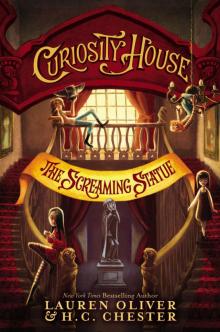 The Screaming Statue
The Screaming Statue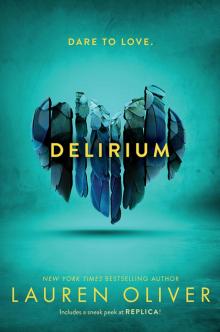 Delirium
Delirium Before I Fall
Before I Fall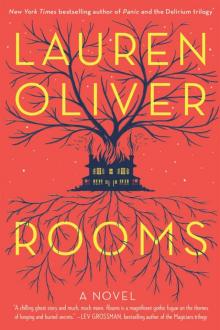 Rooms
Rooms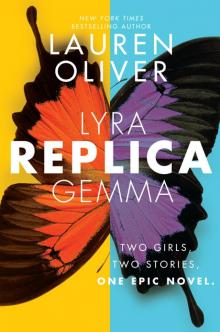 Replica
Replica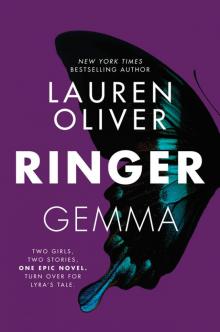 Ringer
Ringer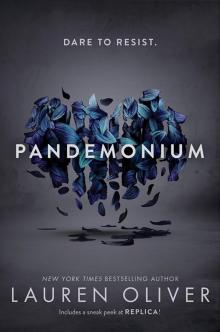 Pandemonium
Pandemonium The Shrunken Head
The Shrunken Head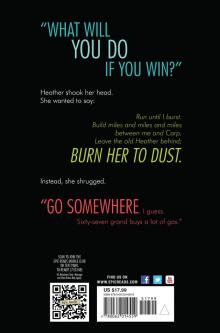 Panic
Panic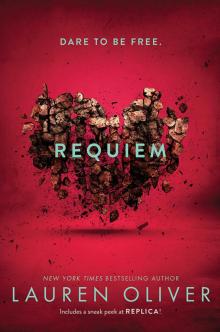 Requiem
Requiem The Spindlers
The Spindlers Annabel
Annabel Liesl & Po
Liesl & Po Raven
Raven Alex
Alex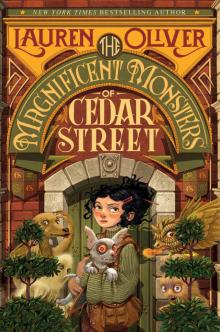 The Magnificent Monsters of Cedar Street
The Magnificent Monsters of Cedar Street Vanishing Girls
Vanishing Girls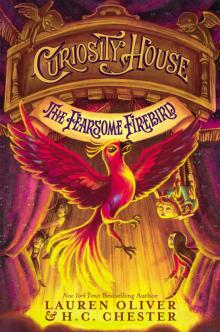 The Fearsome Firebird
The Fearsome Firebird Raven: A Delirium Short Story
Raven: A Delirium Short Story Annabel: A Delirium Short Story
Annabel: A Delirium Short Story Hana: A Delirium Short Story
Hana: A Delirium Short Story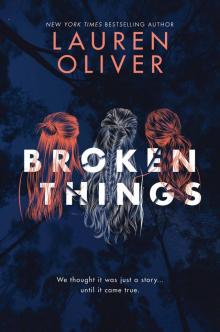 Broken Things
Broken Things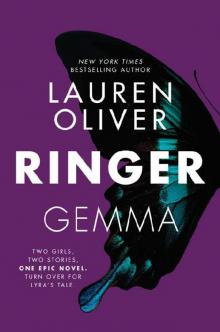 Ringer (Replica)
Ringer (Replica) Alex (delirium)
Alex (delirium)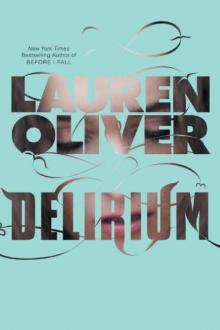 Delirium dt-1
Delirium dt-1